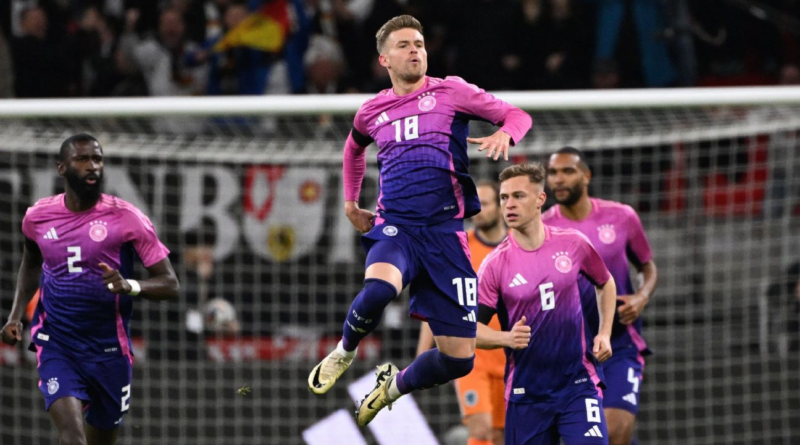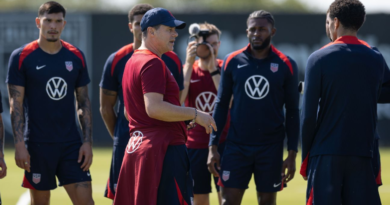Germany, freed from weight of expectation, are ready to fly
FRANKFURT, Germany — The odd thing about watching Germany less than three months from the 2024 European Championship, their first major event on home soil since the 2006 World Cup, is the blasé vibe you get from fans, players and coach Julian Nagelsmann.
The 45,000 fans in attendance for Tuesday’s 2-1 friendly win against Netherlands certainly made a racket, but in a corporate crowd/stadium DJ/pass-the-beer sort of way. They didn’t despair when Joey Veerman put the visitors ahead after just four minutes, nor did they lose their minds when Maxi Mittelstadt — whose errant backpass led to Germany going a goal down — wiped the slate clean with a surgical strike into the top corner a few minutes later.
In fact, their reaction was in line with the music they play after each German goal, chosen as the result of a recent fan-led campaign: a catchy version of Peter Schilling’s “Major Tom” which itself was picked up from this Adidas ad. (Me? I prefer this one from “Breaking Bad.”)
– Stream on ESPN+: LaLiga, Bundesliga, more (U.S.)
The tune, of course, is about an astronaut whose spaceship loses contact with ground control back on Earth and he drifts off into space. While everyone back home mourns, he’s actually content (“floating weightless, coming home”) as he loosens the Earthly shackles and drifts away into the darkness (or maybe the light; we don’t get to find out.)
Were this a ninth-grade English paper, the metaphor with Nagelsmann’s German national team adventure would be almost too obvious. Germany — with their four World Cups and three European crowns and Gary Lineker’s famous declaration that “football is a simple game; 22 players chase a ball for 90 minutes and in the end Germans always win” — may be the ultimate aristocrats of the European game. But in June, it will be eight years since they last won a knockout game in a major tournament. They’re under no illusions about their prospects; confidence is at a low ebb. So why not stop worrying, keep it simple and enjoy the ride for as long as it lasts?
That seemed to be Nagelsmann’s thinking heading into this international break. Unlike the last two outings — defeats at home to Turkey and away to Austria — there were no fancy schemes or out-of-the-box brain waves like Kai Havertz at left-back. Instead, he kept things as simple and straightforward as he could with a tidy 4-2-3-1 system that generally fielded most players in the roles they fill with their clubs. And he let them play, come what may.
With hindsight, it makes sense. Nagelsmann, 36, is the former boy wonder of German football, a guy who got his first senior Bundesliga gig at the age of 28 and went on to coach both RB Leipzig and Bayern Munich. The latter signed him at great expense and fired him a year ago at even greater expense amid grumbling that, for all his brilliance, he was arrogant and immature. That may or may not be true, but the perception of it is true and Nagelsmann knows this.
He took the Germany job in September as a de facto caretaker until after the Euros. Whatever ambitions he had of making his mark on the side via tactics, patterns of play and philosophy appeared to go out the window with those defeats back in November, possibly because he realized what he likely already suspected: that a national-team coach simply doesn’t have the time to effect meaningful change. Not when he only gets a couple training sessions with his squad every couple months.
It’s not just the off-the-shelf 4-2-3-1 that’s a testament to this. It’s also his decision to recall 34-year-old Toni Kroos, three years after his international retirement. The Real Madrid midfielder lined up just behind captain Ilkay Gündogan, 33, giving Germany a central axis long on experience and technical ability but inevitably short on legs and intensity. Which is why, to complete his midfield trio, he turned to a guy like Robert Andrich, who looks like (and often plays like) the sort of bouncer you might see at a warehouse rave. Andrich, 29, made his debut in Saturday’s 2-0 away win over France, and he does the blue-collar grunt work on behalf of Gündogan and Kroos.
It’s a very un-Nagelsmann setup and you can’t imagine him doing this at club level by choice. But that’s the thing about international football: choice is limited. And in the international game being the dogmatic, pig-headed “vision guy” is often the wrong decision. Better to be the pragmatic man-manager, especially when everyone knows you won’t be around for long.
This doesn’t mean that Nagelsmann wasn’t assertive. He cast a pretty wide net with his first squad (which lost to Austria and Turkey) and then jettisoned 11 of those 27 for the more recent group, who beat France and the Dutch. Nor did he have any qualms about playing the same XI in both games, which is rather unusual since most national team coaches — especially when they’ve had only two games in charge and there’s a major tournament coming up — like to rotate so they can get a good look at their resources and avoid annoying clubs who want to keep their guys fresh for the stretch run.
It’s especially notable when you consider the lineup included debutants like Andrich and Mittelstadt. Nagelsmann’s critics accuse him of being entitled and spoiled (and, to be fair, he spent his career at clubs with plenty of resources) but this felt like a willingness to look beyond the big names and plumb the depths of the plebs (so to speak.) Andrich’s Bayer Leverkusen may be running away with the Bundesliga, but he is far from an automatic choice this season, having started 16 of their 26 league games on the bench. It’s a similar story with the 27-year-old Mittelstadt. Stuttgart are flying high in third place, but he too cracked the starting lineup in fewer than two-thirds of their games and was relegated last year at Hertha Berlin.
But it’s a pragmatic, go-with-the-flow assertiveness. The tactics are textbook. You play possession — rather than some complicated, sophisticated press — because you have Kroos, Gündogan and Joshua Kimmich when he steps into midfield. You tuck your wingers — Florian Wirtz and Jamal Musiala — inside because they’re dribblers, that’s their natural tendency and they excel at slipping through balls for your forward.
Don’t let the designed play that led to Wirtz’s goal inside of seven seconds against France fool you, either. Yes, it was planned, and Nagelsmann gave the credit to his assistant Mads Buttgereit, saying it was “excellent prepared.” But let’s not kid ourselves; a “designed play” that ends with a shot from 30 yards out isn’t really a game plan. It’s a scratch card and nothing more — two bucks to win a million.
Nagelsmann, you assume, isn’t going to get carried away by a couple of friendlies. France were thoroughly outplayed, especially in the second half, but it’s not the first time we’ve seen it happen with a Didier Deschamps side. Against a far more technically limited Dutch team that sat deep and clogged space, Germany bossed possession and deserved the win, albeit without dominating and with more than a couple serious defensive lapses. Still, it’s two credible wins in five days and that hasn’t happened since before the pandemic.
Germany may be stuck with a suboptimal blend of young (Wirtz, Musiala) old (Kroos, Gündogan, Manuel Neuer when he returns, and he always does,) and unsung (Andrich, Mittelstadt), but they’re ready to enjoy the ride. And if they stay as blasé as they have been — and treat a Euro run as gravy — they may just get their wish and float weightlessly deep into the competition and, eventually, come home to their rightful place in the game’s pecking order.



